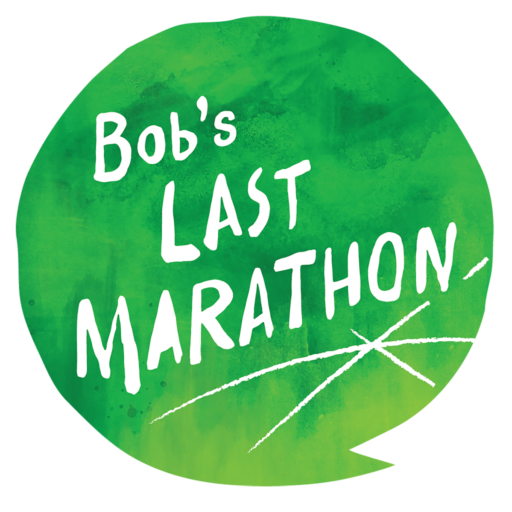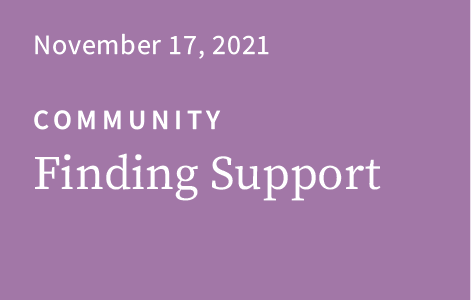Transcript
Finding Support
It goes without saying that receiving a diagnosis of Alzheimer’s disease or a related form of dementia is a life-changing event. And not only for the person with the diagnosis. It affects each person in the family system. Hearing a diagnosis can bring on feelings of shock, denial, sadness, anger, and isolation, and more, for patients and their families.
These feelings are normal. But that doesn’t mean that you have to bear them alone. Very few people are able to get through the Alzheimer’s journey without support, and while finding good support in your community might feel daunting, it does exist. Getting the help you need can make all the difference in your well-being as you embark on this new road.
Support can take many forms, and you may feel the need for more than one type.
Some people welcome the support of community through their religious affiliations. If you have a strong religious affiliation, your organization might also help refer you to other types of support.
For help processing your feelings, you might consider seeing a therapist with expertise in aging, dementia, or caregiving. Psychology Today has an online directory that can help you to find someone with these qualifications and identify a good fit. Your primary care physician may also be able to provide a referral.
If you feel the need to get educated about Alzheimer’s disease, your local Alzheimer’s Association is a great place to start. In addition to volumes of information about Alzheimer’s disease and caregiving, they offer a free 24-hour helpline.
An occupational therapist specializing in dementia can help you learn how to engage your loved one in meaningful activities, and also how to modify your home to help the person with dementia more easily and safely navigate it.
You can tap into a number of creative support networks through Alzheimer’s Disease Research Centers, or ADRCs, at academic institutions. The Penn Memory Center, where I work, is one example. The Penn Memory Center at the University of Pennsylvania offers a wide range of helpful services for families living with dementia—and our Memory Café is among the most popular. Its main goal is to provide a safe, stigma-free zone for social engagement and connection. Once a month, patients and their caregivers gather in a community space to enjoy pastries, coffee, games, and conversation. We bring in artists and performers for a 30-minute interactive activity such as live music, dance, plays, or painting.
Another one of our programs, called Time Out, is a respite and companion program that pairs families with college students trained in dementia care. During scheduled visits at the family’s home, students spend time with the person with dementia, simply as a companion, while giving caregivers a much-needed break.
The Penn Memory Center also offers expert lectures in a variety of topics, ranging from occupational therapy to hospice and palliative care to elder law. But without question, our most popular, and in my opinion most helpful, programs are our caregiver classes and support groups.
Caring for the Caregiver is a class that teaches people about memory loss and neurodegenerative disorders, with an emphasis on the caregiver’s self-care. For two hours, once a week for seven weeks, we bring dementia caregivers together to learn about the disease, how to optimize their caregiving skills, and how to best take care of themselves while they adjust to their ever-changing role as caregivers.
I should note that the label of caregiver can be a difficult one for folks to identify with. We often hear, “I’m not a caregiver, I’m a husband.” To which we respond, “That’s right—you’re both a husband and a caregiver, or care partner.” The class includes a lesson on the truly extraordinary role of Alzheimer’s caregivers. It’s a role that involves providing exceptional care, exceeding usual family relationships. It involves significant expenditures of time, energy, and money over long periods of time, and it involves tasks that can be unpleasant, uncomfortable, psychologically stressful, and physically exhausting.
We help put names and definitions on the concepts that are unique to being an Alzheimer’s caregiver, creating a framework for demystifying their experience. Caregiver burden is a term that describes the interplay between the emotional, physical, social, and financial stressors involved in caring for someone with dementia. The phrase ambiguous loss describes the singular challenge of caring for someone who is here physically but also not here psychologically or emotionally. Introducing these concepts helps dementia caregivers make sense of their new roles—and helps caregivers understand why they feel the way they do, and perhaps move toward a more positive way of thinking about the situation.
Participants learn how to integrate pleasant activities into their daily lives, how to become “behavioral detectives” and how to modify the environment. They also learn ways to effectively communicate with the person they care for, as well as others in their support network. Through mindfulness exercises, participants practice being in the present moment, rather than getting stuck in the past or fretting about the future.
But the most valuable aspect of the class is in its shared experience, creating a conduit for connecting. By the end of the class, participants have often developed a strong bond. And as a way to stay connected to one another, they often opt to enroll in a caregiver support group.
Support groups focus on the emotional and relational aspects of Alzheimer’s caregiving, rather than the intellectual. In support groups the professional serves as a facilitator who defers to the collective group to take the lead, which means deciding together on the topics and providing mutual support.
There’s a natural arc to a support group. Hungry for information, at the beginning members tend to be fact-seekers. They are eager to hear others’ experiences and learn from each other. They pursue solutions to problems, and strategies for planning the unknown steps ahead.
Sticking to the facts is helpful, but from a therapeutic perspective, expressing and understanding the painful emotions that arise is important—and the group setting can help with this process. It’s the facilitator’s role to take the members to a deeper stage, by helping them reach for their feelings.
As the groups evolve and members feel more comfortable with one another, sharing and expressing feelings becomes more natural—and this is where the healing happens. As their loved one’s dementia progresses, friends and family members may drift away—but the support group friends are always there. Deep friendships can form. They can share the sorrows of yet another loss in their loved one’s function, as well as the joys of becoming grandparents.
It is immensely rewarding to bring strangers together and watch them develop a bond that enables them to nurture and love one another, sometimes to the point where they refer to their caregiver support group as family.
If you feel unsure about joining a group, I do encourage you to try one. To get the most out of the group, I also encourage you to actively participate! After all, you have a lot to offer, and the point of the group is to both give and receive support. Keep in mind that, as with any emotional relationship, the chemistry matters, so if the first one you try does not feel right, please don’t give up. Keep trying until you find the right fit. Seeking and finding a group of people going through a shared experience can be a lifeline.
No one chooses an Alzheimer’s diagnosis. It’s a turning point that can shatter your assumptions about the way the world works. The journey families must endure is long and unsure, and it can be lonesome. Finding connection and support during this difficult time can make all the difference in the well-being of the person with dementia, and their caregiver.
Felicia Greenfield, MSW, LCSW
Executive Director
Penn Memory Center
www.pennmemorycenter.org

